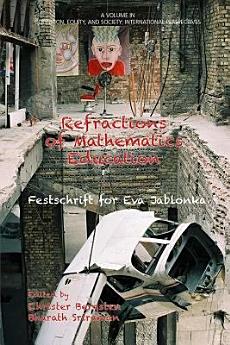Refractions of Mathematics Education: Festschrift for Eva Jablonka
Christer Bergsten · Bharath Sriraman
মে’ ২০১৫ · IAP
ইবুক
239
পৃষ্ঠা
family_home
যোগ্য
info
reportমূল্যাংকন আৰু পৰ্যালোচনা সত্যাপন কৰা হোৱা নাই অধিক জানক
এই ইবুকখনৰ বিষয়ে
The diversity of research in mathematics education has been addressed as both, a problem and a strength. When manifested through adherence to different intellectual roots and theoretical orientations, diversions constitute ‘refractions’ of mathematics education. The collection and analysis of empirical data in a study are by necessity refracted through the specific analytical lens employed, as well as the aim of the study itself. Refractions can also refer to looking at old phenomena through new lenses. The chapters in this book are refracted through philosophical, political, mathematical and personal lenses by distinguished authors in the field, addressing issues about the elusive experience of doing mathematics, purification of texts, refractions, mathematics and ethnomathematics, political messages in textbook tasks, mathematics education policy debate, the political in mathematics education research, philosophy and mathematics, meanings and representations, identity of mathematical modeling, and dilemmas in the teaching of calculus. An ancient Sanskrit adage states that Knowledge is something that grows when shared, but shrinks when hoarded. Academics engaged in the generation of new Knowledge are blessed with both the time and the freedom to engage in pursuits that allow for intellectual pleasure. As a phenomenon of the Zeitgeist many have succumbed to the increased corporatization of academic work, engaging in activities for monetary and self advancement purposes. Are there any real intellectuals left in academia, a là Adorno, Bourdieu, Chomsky, Foucault, among others? This Festschrift is dedicated to academics that don't bother with self promotion or aggrandizement of themselves or their ideas in simplistic terms.
এই ইবুকখনক মূল্যাংকন কৰক
আমাক আপোনাৰ মতামত জনাওক।
পঢ়াৰ নির্দেশাৱলী
স্মাৰ্টফ’ন আৰু টেবলেট
Android আৰু iPad/iPhoneৰ বাবে Google Play Books এপটো ইনষ্টল কৰক। ই স্বয়ংক্রিয়ভাৱে আপোনাৰ একাউণ্টৰ সৈতে ছিংক হয় আৰু আপুনি য'তে নাথাকক ত'তেই কোনো অডিঅ'বুক অনলাইন বা অফলাইনত শুনিবলৈ সুবিধা দিয়ে।
লেপটপ আৰু কম্পিউটাৰ
আপুনি কম্পিউটাৰৰ ৱেব ব্রাউজাৰ ব্যৱহাৰ কৰি Google Playত কিনা অডিঅ'বুকসমূহ শুনিব পাৰে।
ই-ৰীডাৰ আৰু অন্য ডিভাইচ
Kobo eReadersৰ দৰে ই-চিয়াঁহীৰ ডিভাইচসমূহত পঢ়িবলৈ, আপুনি এটা ফাইল ডাউনল’ড কৰি সেইটো আপোনাৰ ডিভাইচলৈ স্থানান্তৰণ কৰিব লাগিব। সমৰ্থিত ই-ৰিডাৰলৈ ফাইলটো কেনেকৈ স্থানান্তৰ কৰিব জানিবলৈ সহায় কেন্দ্ৰত থকা সবিশেষ নিৰ্দেশাৱলী চাওক।





